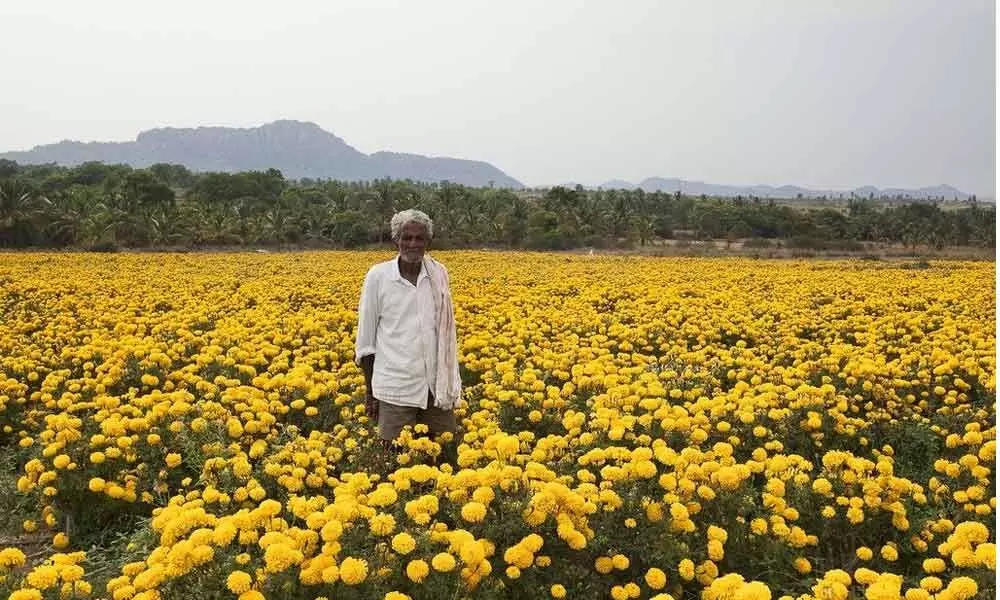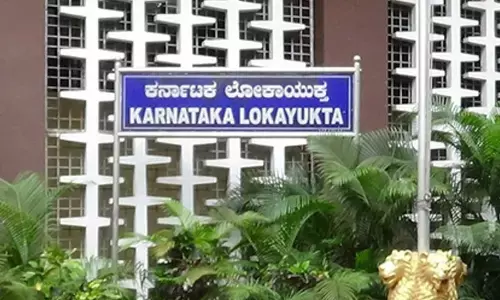Floriculture, the way forward
 The whole world may have locked down but time hasn't stopped. And flowers haven't stopped blooming.
The whole world may have locked down but time hasn't stopped. And flowers haven't stopped blooming.The Coronavirus lockdown has hit virtually every business and every segment of the population. But some are suffering irretrievable losses, giving rise to major questions about handling unforeseen exigencies.
Telangana has thousands of farmers engaged in floriculture, chiefly in Ranga Reddy, Nalgonda, Mahabubnagar and Khammam districts, growing marigold, chrysanthemum, rose, jasmine, crossandra, tuberose crops as well as exotic, western varieties such as Gerberas, Carnations, orchids, gladioli etc. It is estimated that in 2018-19, flower farming happened across Telangana in an area of about 12,000 hectares open cultivation and 400 hectares in polyhouses, producing about 55,000 metric tonnes of flowers and 1287 lakh cut flowers. While traditional flowers are grown in open cultivation, cut flowers are grown in polyhouses, catering majorly to urban markets.
"Market demand for flowers is always consistent and there is rarely ever anything called over-production. Given the short lifespan of flowers, production areas are also situated close to urban centres and we have extensive cultivation in areas such as Shamshabad, Chevella, Moinabad, Shankarpally and the supply is consistent. It is rare that this chain is affected," says Dr P LalitaKameswari, senior floriculturist.
But now with city markets closing down for Corona Lockdown, flower harvesting came to a standstill. And the flower farmers are simply not prepared to handle the sudden crisis.
"Fortunately, it is now season for only Jasmine and some marigolds and polyhouse flowers such as Chrysanthemums are almost at the end of their season. The loss is mainly for Jasmine growers," says Dr Lalita.
Corona Lockdown may be an extreme situation but is there any contingency plan to mitigate loss in flower crops in times of any kind of emergency?
"Unlike food crops, flowers are grown in a much smaller geographic areas, in pockets as a niche segment with defined market processes. Therefore, they have no regular policies beyond insurance, such as MSP, buyback or compensation. They are highly perishable and it is hard to implement any contingency plans," says Dr P Prashant, Senior Scientist and Head of Floriculture Research Station in Telangana State Horticultural University.
Floriculture needs specialised support in terms of irrigation, fertilisers, temperature control, harvesting, transportation and distribution. "But it is largely an unorganised market as the consumption happens close to production centres. And while farmers who grow traditional flowers find a setback in the change in people's preferences towards exotic western flowers, primarily for decoration, there is greater facility for urban rich farmers in polyhouse cultivation," explains Dr GV Ramanjaneyulu of Centre for Sustainable Agriculture.
Despite some support from the State Horticulture Department as the farmers remain largely scattered, operating individually, a time of calamity leaves them in the lurch. Many farmers have hundreds of metric tonnes of flowers on their hands, especially marigolds from the tail of the season.
The solution lies in enhancing value addition, experts say. "Flower storage is totally unviable. It is only roses and exotic flowers to some extent that can be stored. That too for a short period under stringently controlled temperatures. Processing is the key. There is now a dedicated market emerging for flower-based products such as dyes, dry flowers though not all flowers are suitable for drying, food products etc," Dr Lalita lists out.
There is demand for a greater range of products, such as incense sticks, pot pourri for the elite urban consumer, air fresheners, rose water, Gulkand and this may be a good time to explore product range.
"Value addition will actually help in lean periods, may help in area expansion and crop diversification in floriculture. Cosmetic industry is a huge sector and will require much from the flower cultivation. We are now importing expensive essential oils, we may actually aim to achieve self-reliance," says Dr Prashant.
Farmers need to be trained to meet needs arising out of growing awareness, find cost-effective technologies for drying, processing and expansion, he says. The Floriculture station is working on dry flower technologies as well as on a national-level project on conservation and maintenance of germ plasma of six varieties of flowers and testing new technologies for drip irrigation and fertilisers for flower plants.
"Farmers need to get greater technical support and be educated in value addition,'' Dr Lalita adds.
Dr Ramanjaneyulu sums up the takeaways from the Corona episode for flower cultivators. "This may be a good time for a shift. There is bound to be a greater inclination towards the natural and natural products. and away from the synthetic. Processed segment for flowers is steadily growing and it could benefit from more output from the farmers."
The mass exodus of migrant workers back to their villages holds a greater portent than what is visible, he says. The workers may not choose to come back immediately and it could convert into expansion of cultivation, uncultivated land may come under cultivation, there could be abundance of labour available, solving one of the biggest current problems in agriculture. All it takes is to create a window of opportunity in rural areas, for cultivation as well as processing and that will mean a significant shift in the way agro-economy works.
Kavita Reddy from RatnamKhadiUdyog says that there are horticulture farmers, who are abandoning their crop leaving it to rot or letting it stayunharvested, in despair. They have invested their money and are now dejected with lack of market. She feels the government through rural machinery must reach out to these farmers to let them know of alternate markets and demonstrate the method of drying and packaging and provide them support to market the dried flowers after lockdown so that they can get some compensation for their crop. "I suggest that the farmers who are into floriculture should dry the flowers and stick them. There is a demand for the dry flowers in natural dyes which are used in textile dyeing industry and in perfume manufacturing units. The farmers will get good price," she adds.
Lockdown is the time when administrations, especially at the district collector and agriculture officer levels, need to reach out to flower farmers in their districts immediately and send the message across on saving their crops to the extent possible. They must initiate the process for future value addition ventures opening up whole new possibilities in floriculture. And, cliched it may be, but whatever calamities may befall humanity, life may once again be a rose-strewn path for the flower farmer.









